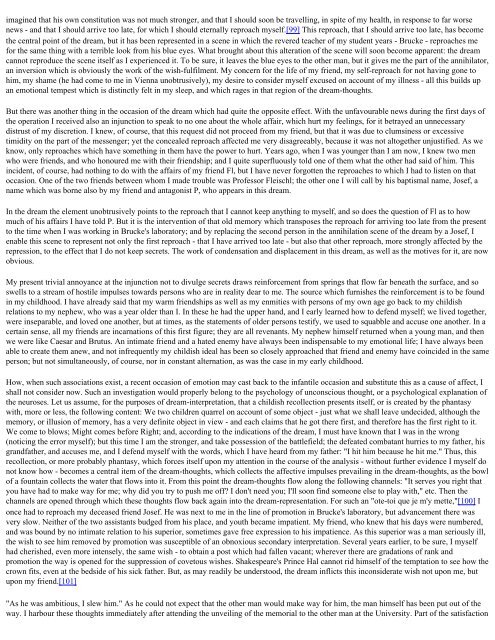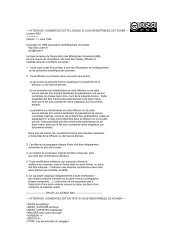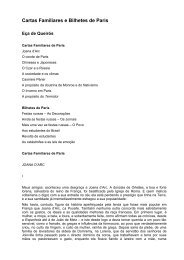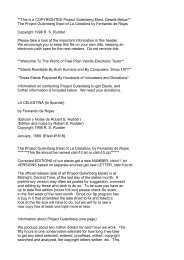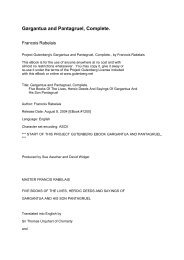The Interpretation of Dreams Sigmund Freud (1900)
The Interpretation of Dreams Sigmund Freud (1900)
The Interpretation of Dreams Sigmund Freud (1900)
You also want an ePaper? Increase the reach of your titles
YUMPU automatically turns print PDFs into web optimized ePapers that Google loves.
imagined that his own constitution was not much stronger, and that I should soon be travelling, in spite <strong>of</strong> my health, in response to far worse<br />
news - and that I should arrive too late, for which I should eternally reproach myself.[99] This reproach, that I should arrive too late, has become<br />
the central point <strong>of</strong> the dream, but it has been represented in a scene in which the revered teacher <strong>of</strong> my student years - Brucke - reproaches me<br />
for the same thing with a terrible look from his blue eyes. What brought about this alteration <strong>of</strong> the scene will soon become apparent: the dream<br />
cannot reproduce the scene itself as I experienced it. To be sure, it leaves the blue eyes to the other man, but it gives me the part <strong>of</strong> the annihilator,<br />
an inversion which is obviously the work <strong>of</strong> the wish-fulfilment. My concern for the life <strong>of</strong> my friend, my self-reproach for not having gone to<br />
him, my shame (he had come to me in Vienna unobtrusively), my desire to consider myself excused on account <strong>of</strong> my illness - all this builds up<br />
an emotional tempest which is distinctly felt in my sleep, and which rages in that region <strong>of</strong> the dream-thoughts.<br />
But there was another thing in the occasion <strong>of</strong> the dream which had quite the opposite effect. With the unfavourable news during the first days <strong>of</strong><br />
the operation I received also an injunction to speak to no one about the whole affair, which hurt my feelings, for it betrayed an unnecessary<br />
distrust <strong>of</strong> my discretion. I knew, <strong>of</strong> course, that this request did not proceed from my friend, but that it was due to clumsiness or excessive<br />
timidity on the part <strong>of</strong> the messenger; yet the concealed reproach affected me very disagreeably, because it was not altogether unjustified. As we<br />
know, only reproaches which have something in them have the power to hurt. Years ago, when I was younger than I am now, I knew two men<br />
who were friends, and who honoured me with their friendship; and I quite superfluously told one <strong>of</strong> them what the other had said <strong>of</strong> him. This<br />
incident, <strong>of</strong> course, had nothing to do with the affairs <strong>of</strong> my friend Fl, but I have never forgotten the reproaches to which I had to listen on that<br />
occasion. One <strong>of</strong> the two friends between whom I made trouble was Pr<strong>of</strong>essor Fleischl; the other one I will call by his baptismal name, Josef, a<br />
name which was borne also by my friend and antagonist P, who appears in this dream.<br />
In the dream the element unobtrusively points to the reproach that I cannot keep anything to myself, and so does the question <strong>of</strong> Fl as to how<br />
much <strong>of</strong> his affairs I have told P. But it is the intervention <strong>of</strong> that old memory which transposes the reproach for arriving too late from the present<br />
to the time when I was working in Brucke's laboratory; and by replacing the second person in the annihilation scene <strong>of</strong> the dream by a Josef, I<br />
enable this scene to represent not only the first reproach - that I have arrived too late - but also that other reproach, more strongly affected by the<br />
repression, to the effect that I do not keep secrets. <strong>The</strong> work <strong>of</strong> condensation and displacement in this dream, as well as the motives for it, are now<br />
obvious.<br />
My present trivial annoyance at the injunction not to divulge secrets draws reinforcement from springs that flow far beneath the surface, and so<br />
swells to a stream <strong>of</strong> hostile impulses towards persons who are in reality dear to me. <strong>The</strong> source which furnishes the reinforcement is to be found<br />
in my childhood. I have already said that my warm friendships as well as my enmities with persons <strong>of</strong> my own age go back to my childish<br />
relations to my nephew, who was a year older than I. In these he had the upper hand, and I early learned how to defend myself; we lived together,<br />
were inseparable, and loved one another, but at times, as the statements <strong>of</strong> older persons testify, we used to squabble and accuse one another. In a<br />
certain sense, all my friends are incarnations <strong>of</strong> this first figure; they are all revenants. My nephew himself returned when a young man, and then<br />
we were like Caesar and Brutus. An intimate friend and a hated enemy have always been indispensable to my emotional life; I have always been<br />
able to create them anew, and not infrequently my childish ideal has been so closely approached that friend and enemy have coincided in the same<br />
person; but not simultaneously, <strong>of</strong> course, nor in constant alternation, as was the case in my early childhood.<br />
How, when such associations exist, a recent occasion <strong>of</strong> emotion may cast back to the infantile occasion and substitute this as a cause <strong>of</strong> affect, I<br />
shall not consider now. Such an investigation would properly belong to the psychology <strong>of</strong> unconscious thought, or a psychological explanation <strong>of</strong><br />
the neuroses. Let us assume, for the purposes <strong>of</strong> dream-interpretation, that a childish recollection presents itself, or is created by the phantasy<br />
with, more or less, the following content: We two children quarrel on account <strong>of</strong> some object - just what we shall leave undecided, although the<br />
memory, or illusion <strong>of</strong> memory, has a very definite object in view - and each claims that he got there first, and therefore has the first right to it.<br />
We come to blows; Might comes before Right; and, according to the indications <strong>of</strong> the dream, I must have known that I was in the wrong<br />
(noticing the error myself); but this time I am the stronger, and take possession <strong>of</strong> the battlefield; the defeated combatant hurries to my father, his<br />
grandfather, and accuses me, and I defend myself with the words, which I have heard from my father: "I hit him because he hit me." Thus, this<br />
recollection, or more probably phantasy, which forces itself upon my attention in the course <strong>of</strong> the analysis - without further evidence I myself do<br />
not know how - becomes a central item <strong>of</strong> the dream-thoughts, which collects the affective impulses prevailing in the dream-thoughts, as the bowl<br />
<strong>of</strong> a fountain collects the water that flows into it. From this point the dream-thoughts flow along the following channels: "It serves you right that<br />
you have had to make way for me; why did you try to push me <strong>of</strong>f? I don't need you; I'll soon find someone else to play with," etc. <strong>The</strong>n the<br />
channels are opened through which these thoughts flow back again into the dream-representation. For such an "ote-toi que je m'y mette,"[100] I<br />
once had to reproach my deceased friend Josef. He was next to me in the line <strong>of</strong> promotion in Brucke's laboratory, but advancement there was<br />
very slow. Neither <strong>of</strong> the two assistants budged from his place, and youth became impatient. My friend, who knew that his days were numbered,<br />
and was bound by no intimate relation to his superior, sometimes gave free expression to his impatience. As this superior was a man seriously ill,<br />
the wish to see him removed by promotion was susceptible <strong>of</strong> an obnoxious secondary interpretation. Several years earlier, to be sure, I myself<br />
had cherished, even more intensely, the same wish - to obtain a post which had fallen vacant; wherever there are gradations <strong>of</strong> rank and<br />
promotion the way is opened for the suppression <strong>of</strong> covetous wishes. Shakespeare's Prince Hal cannot rid himself <strong>of</strong> the temptation to see how the<br />
crown fits, even at the bedside <strong>of</strong> his sick father. But, as may readily be understood, the dream inflicts this inconsiderate wish not upon me, but<br />
upon my friend.[101]<br />
"As he was ambitious, I slew him." As he could not expect that the other man would make way for him, the man himself has been put out <strong>of</strong> the<br />
way. I harbour these thoughts immediately after attending the unveiling <strong>of</strong> the memorial to the other man at the University. Part <strong>of</strong> the satisfaction


